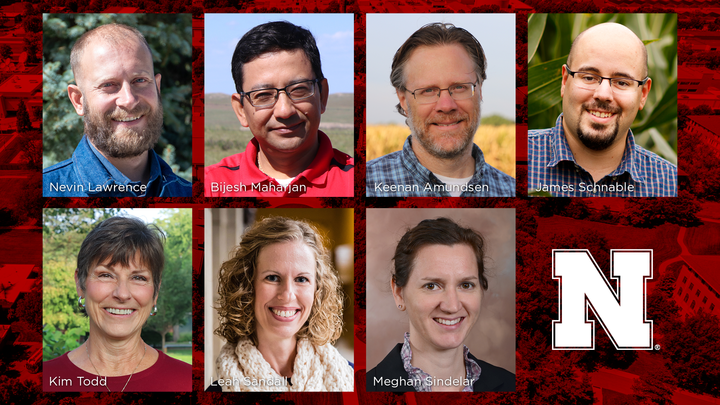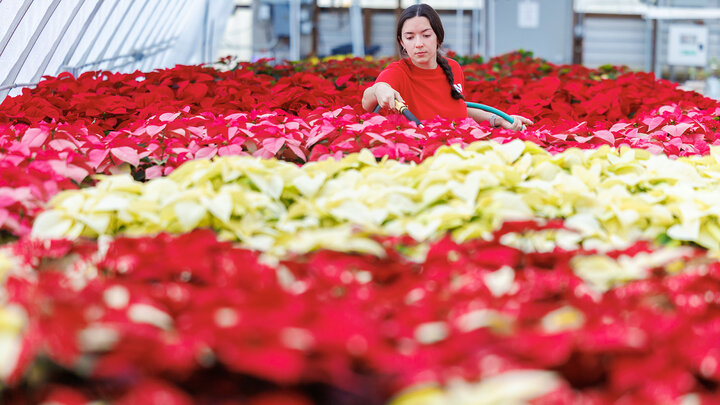Seven Department of Agronomy and Horticulture faculty will receive promotion and/or tenure in 2022. They are among the 111 University of Nebraska–Lincoln faculty honored this year.
Nevin Lawrence promoted to associate professor and granted tenure. Lawrence received a Bachelor of Science in agroecology and a Master of Science in agronomy from the University of Wyoming. He earned a doctorate in crop science from Washington State University. Lawrence joined the department faculty as an assistant professor and a weed management specialist at the Panhandle Research and Extension Center in Scottsbluff in 2016.
Lawrence’s research and extension focus is the development of weed management programs that leverage crop rotations and other cultural practices to supplement the sometimes-limited weed control options available in Western Nebraska. Specific projects include controlling herbicide-resistant kochia and pigweed species using multi-year integrated management plans, integrating cover crops into crop rotations where establishment opportunities are limited, and developing tools to assist stakeholders with modeling the economic costs of using diversified herbicide-based weed management plans. Non-crop research and extension projects include the management of invasive weeds in rangeland.
Bijesh Maharjan promoted to associate professor and granted tenure. Maharjan received a Bachelor of Science in ecology and a Master of Science in environmental engineering from the University of North Dakota. He earned a doctorate in land and atmospheric science (soil science track) from the University of Minnesota. Maharjan was a postdoc research associate in the department before he joined the faculty as an assistant professor and a soil and nutrient management specialist at the Panhandle Research and Extension Center in Scottsbluff in 2016.
Maharjan leads research and extension programs focused on improved soil productivity and precision nutrient management in irrigated, limited irrigation, and dryland crop and forage production systems in the Nebraska Panhandle. His significant research and extension efforts include developing and revising soil and nutrient management for several Nebraska Panhandle crops, soil health, soil health gap, and climate-smart agriculture.
He represents Nebraska in the USDA Multistate Hatch Committee NCERA 13 and NCERA 103. He is an active member of the Agronomy Society of America, Crop Science Society of America, American Geophysical Union, International Society of Precision Agriculture, Soil Science Society of America and Soil and Water Conservation Society. Additionally, he is a Daugherty Water for Food Global Institute Fellow.
Keenan Amundsen promoted to professor. Amundsen received a bachelor’s degree in mathematics from Alma college. He also earned a bachelor’s degree and a Master of Science in crop and soil sciences from Michigan State University. In addition, he received a doctorate in bioinformatics and computational biology from George Mason University. Amundsen joined the department faculty as an assistant professor in turfgrass genetics in 2011 and was promoted to associate professor and granted tenure in 2017.
Amundsen coordinates research to understand how turfgrasses sense and respond to their environment. His group develops genetic tools based on those conditional responses useful for germplasm and cultivar development. Amundsen is an industry leader in dioecious plant breeding, polyploid genetics and computational biology methodology used to study minor species. He has an active teaching program at the undergraduate and graduate levels and contributes courses in turfgrass management, plant breeding and genetics, and technical communication. His passion for education is evident through his extensive service on student supervisory committees and near-continuous appointments to the departmental curriculum and graduate committees. He is a servant leader, engaged in several service roles committed to the department, university and the industries he serves.
James Schnable promoted to professor. Schnable received a bachelor’s degree in biology from Cornell University and a doctorate in plant biology from the University of California, Berkeley. Schnable joined the department faculty as an assistant professor of computational biology in 2014. He was promoted to associate professor, granted tenure and appointed to the Charles O. Gardner Professor of Agronomy endowed professorship in 2019.
Schnable leads and mentors a team of postdocs, graduate students, technicians, and undergraduate researchers across the Department of Agronomy and Horticulture, the Center for Plant Science Innovation, and the Nebraska Food for Health, working on topics including plant genetics, genomics and breeding, high throughput phenotyping and artificial intelligence. In support of these goals, his research team conducts corn field trials, proof of concept studies, and engineering demonstrations from Scottsbluff to Wahoo, Nebraska.
His research and team are currently supported by the National Science Foundation, the Department of Energy, the U.S. Department of Agriculture, the Foundation for Food and Agricultural Research, and the Nebraska Corn Growers, with past support from private companies and international nongovernmental organizations. In addition to his academic duties, Schnable has founded three companies working in the bioinformatics, climate-resilient agriculture, and precision agronomy spaces giving him firsthand knowledge of the importance of and barriers to translating academic research into real-world impacts.
Kim Todd promoted to professor. Todd received a Bachelor of Science in landscape architecture from Iowa State University and a Master of Arts in adult and continuing education with an emphasis on community and human resources from the University of Nebraska–Lincoln. Todd came to the university in 1979 and served in various roles through a split appointment as campus landscape architect, assistant professor in the College of Architecture and the Department of Horticulture, and assistant to the Chancellor for community affairs and planning. She joined the department faculty as an assistant professor and an extension horticulture specialist in 2002. She was promoted to associate professor and granted tenure in 2008 and continues to hold a professional license in landscape architecture.
Todd’s significant work is guiding undergraduate and graduate student learning, from many majors, about the significance of the landscape as a system focused on plant knowledge, landscape design, implementation and sustainable management. Engaged, hands-on student learning takes place in many outdoor spaces envisioned and designed by Todd, including the Backyard Farmer Gardens and Keim Courtyard, and in various places in communities. She emphasizes the essential connection between art and science and the importance of offering students the opportunity to critically assess and justify their decisions.
She is the host and primary content team faculty for Backyard Farmer, linking a broad audience to focused segments on topics of interest and critical issues. Her teaching and extension work are inextricably intertwined and often feature the success of current and former students in their chosen careers.
Leah Sandall promoted to associate professor of practice. Sandall received a Bachelor of Science in agronomy and a Master of Science in agronomy specializing in plant breeding and genetics from the University of Nebraska–Lincoln. She joined the department faculty as an extension assistant with the Pesticide Safety Education Program in 2008. In 2010, she was hired as a lecturer and instructional designer in the department and was hired as an assistant professor of practice and distance education coordinator for the department’s online and distance education program in 2015.
Sandall’s focus is to provide quality online learning opportunities for students and the public. She directs the online Master of Science in agronomy and graduate certificate programs as well as PASSeL, the Plant and Soil Sciences eLibrary. She teaches online, engaging undergraduate and graduate students. Sandall collaborates with students, staff and faculty to support the delivery of online extension and teaching materials, providing flexibility for learners.
Meghan Sindelar promoted to associate professor of practice. Sindelar received Bachelor of Science degrees in agronomy and international agriculture from Iowa State University. She earned a Master of Science in agronomy and a doctorate in agronomy with an emphasis in applied soil physics from Kansas State University. She joined the department faculty as an assistant professor of practice in 2015.
Sindelar is a leader in the agronomy curriculum and instructor for core courses such as Soil Resources, Soil Nutrient Relationships, and Agronomic Plant Science, where students learn and practice field skills for today while discussing adaptions for the future. She is also the adviser of the Agronomy Club, which provides undergraduate students the opportunity to network with industry agronomists and serve their community through agronomy outreach. Sindelar’s research centers on innovative classroom methods to increase student engagement and learning in agronomy courses.




